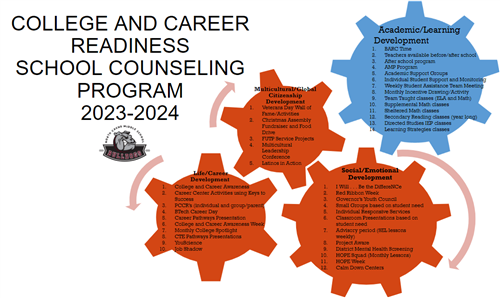-
Utah's College & Career Readiness
School Counseling Program
Our school has a counseling program that is
comprehensive in scope, preventative in design and developmental in nature.
Comprehensive Counseling consists of the following four components:
Systemic Approach to Dropout Prevention with Social/Emotional Supports: This component consists of activities to meet students’ immediate needs. These needs may include individual counseling, group counseling, academic consultation, outside referrals, truancy mediation, conflict resolution, self-help information, etc.
Plan for College & Career Readiness: This College and Career Readiness component consists of school counselors coordinating ongoing systemic activities designed to assist the individual student in establishing personal goals and developing future plans. At North Cache our students research careers, set goals for the future and start planning out their high school/college education. Students in the 8th grade meet individually with their counselor and parents to discuss these things. The 7th grade students meet in a small group setting with the counselors during their College & Career Awareness class. Students also get a great deal of information about future planning through their guidance curriculum lessons.
Collaborative Classroom Instruction: The purpose of the Collaborative Classroom Instruction component is to provide all students with the knowledge and skills appropriate for their developmental level. The curriculum covers information students need, but isn't taught in the traditional classroom. Here at North Cache we teach topics such as career exploration, high school graduation and college entry requirements, financial aid assistance, job applications, resumes, interviewing skills, team building, and more.
Systemic Program Management: This component consists of management activites that establish, maintain, and enhance the total school counseling program. School counselors use their leadership and advocacy skills to promote systemic change by contributing in the following areas using a minimum of counselor time: professional development; consultation and referrals; collaboration, outreach, and advocacy; program management and operations; technology use.
Select a School...
Select a School
- Birch Creek ES
- Canyon ES
- Cedar Ridge ES
- Greenville ES
- Heritage ES
- Lewiston ES
- Lincoln ES
- Millville ES
- Mountainside ES
- Nibley ES
- North Park ES
- Providence ES
- River Heights ES
- Summit ES
- Sunrise ES
- Wellsville ES
- White Pine ES
- North Cache MS
- South Cache MS
- Spring Creek MS
- Cache HS
- Green Canyon HS
- Mountain Crest HS
- Ridgeline HS
- Sky View HS


